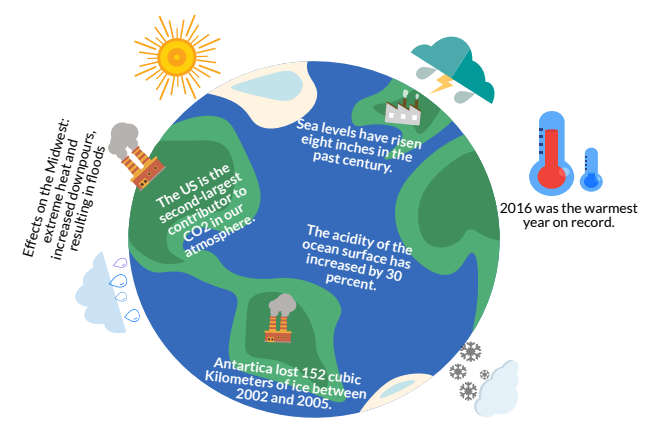Global Warning: The Reality Of Climate Change
Climate Change has negatively affected the Earth in recent years; sea levels and average temperatures have risen, while glaciers and ice caps are melting.
In recent years, climate change has been a growing issue around the globe. Since 1917, the Earth’s average temperature has increased by about one degree Fahrenheit, from 60° to 61°, according to NASA.
The phrase “climate change” often gets confused with “global warming,” which is not the same thing. “Global warming” refers specifically to the rise of the Earth’s average temperature while “climate change would be the long-term progression of climate in one direction or another,” said LHS Science Department Supervisor, Mr. Pete Dawson.
Climate change can refer to anything like changes in temperature, precipitation or wind patterns, as taught by geography classes at LHS. Basically, climate change is caused by the release of greenhouse gases into the atmosphere. A common example of this, according to the school’s geography classes, is carbon dioxide, which is released through deforestation, industrial practices, and the burning of fossil fuels for energy.
Although it might not be evident to everyone, the effects of climate change are all around. It is the reason for recent floods, droughts, hurricanes and the melting of glaciers, according to Mr. Dawson.
“Coastal regions are going to be the first things that are affected by this. You already see it in some of the hurricane issues that we are having. The prediction is that we’ll get more powerful hurricanes,” explained Mr. Dawson. “It’s hard to tell if we are going to get more or less actual storms but just because there’s more energy in the system, the chances are that they’re going to have more energy when they form.”
On top of the recent hurricanes, glaciers and ice caps have been melting at an alarming rate. This causes ocean levels to rise and they could potentially rise above the land level in certain places. When this happens, some animals’ habitats and homes disappear, and they will have nowhere to go, thus causing species to die out, Mr. Dawson explained.
Even though there is evidence all around that climate change is a developing issue, there are people who deny the fact that it is happening.
“There are some interests, that I think are primarily economically driven, who are actively confusing the topic for people [although] the polls generally show the majority of people, actual citizens, are concerned about it and believe the scientific evidence,” stated Mr. Dawson.
The effects of climate change are almost irreversible, but there are small steps that individuals can take to slow down its development. Mr. Dawson expressed the importance of being conscious of energy and resource usage, and to minimize it: “Energy conservation things are all going to be helpful whether it’s transportation energy or heating your house, cooling your house. All of those energy intensive things are probably the main drivers.”
Along with being aware, “the biggest impact would be by choosing [government] representatives who can put in place regulations; laws monitoring that would actually have a bigger impact on systematic changes in behavior. It’s really difficult for any individual person to make the impact that we would need,” Mr. Dawson said.
He also expressed the idea that those in government can see this problem coming and they need to talk to big corporations and tell them that in order to keep the cost of preventing climate change down, they need to invest now to minimize the impact it will have on the country and on the world in the future.

This is my fourth year on staff. At LHS, I'm involved in golf and lacrosse. Outside of school, I like to hang out with my dogs, drink coffee and sleep....

This is my second year on the Drops of Ink staff. Beside DOI, I am also involved in Advocats and NHS at LHS.




